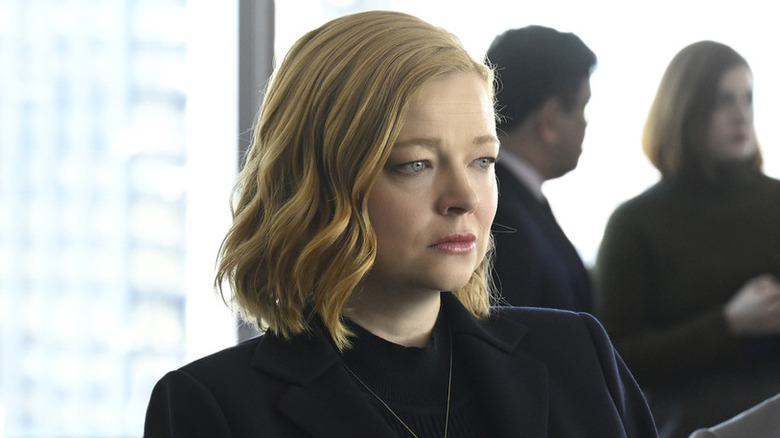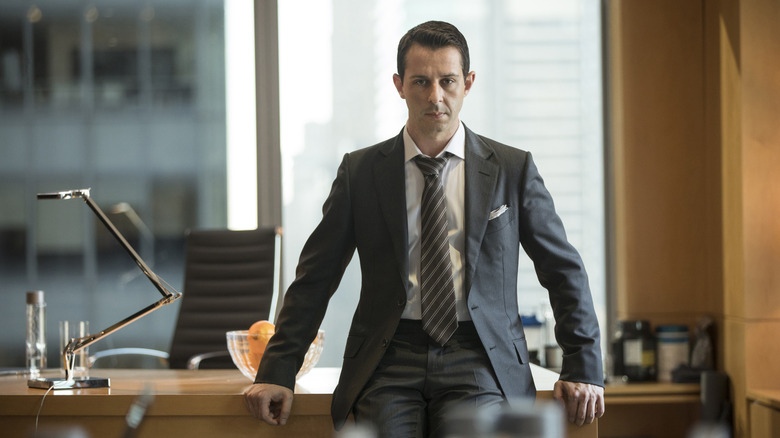Succession: The Series Finale Connects Shiv And Kendall's Downfall Four Seasons Apart
At this point, it should be considered mercy that the Roy children no longer have control over the media. In the series finale of HBO's "Succession," a would-be CEO makes an almost identical blunder to one committed in the series premiere, connecting the show's two most pivotal moments in a darkly comic manner.
As Lukas Matsson (Alexander Skarsgård) wrestles with the reality of having Shiv Roy (Sarah Snook) as his business partner for the foreseeable future, one petty event finally pushes him over the edge. No, it wasn't her reaction to his confession that he sent unsolicited bricks of blood to a coworker, the grossly inflated GoJo subscribers in India, or even her failure to see prospective political ally Daniel Jimenez (Elliot Villar) elected as President. While all of these factors certainly set him on this path, the final straw wound up being a particularly Jejune cartoon of the prodigal daughter manipulating the Scandinavian tech impresario like a puppet.
Though it makes for an amusingly fitting final running gag for the episode, Shiv's puppeteer portrayal — which, let's face it, she probably planted herself — poetically ties her hubristic downfall to that of her brother Kendall's (Jeremy Strong) in the series premiere, "Celebration." While brutal patriarch Logan Roy (Brian Cox) names the flailing Vaulter acquisition and his naive acceptance of the revised family trust as reasons for stalling the "eldest boy's" promotion to CEO, it ultimately appears to be a tacky magazine cover naming him "heir with the flair" that breaks the proverbial camel's back. More than serving as decent comedic fodder, both siblings' pathetic attempts to control the narrative of their ascent to power give the show an opportunity to flex its rare gift for humanizing god-like characters in the worst way possible.
How Succession denies the myth of the meritocracy
Of all its many triumphs, "Succession" will be remembered for its unparalleled ability to depict how the most powerful people in the world can also be the least rational. Usually, in sleek, machiavellian corporate dramas, the elite ones achieve and maintain status by being the smartest people in any room they walk into while playing psychological chess matches that crown the most cunning competitor as king. Such conflict makes for arresting entertainment — but it is, ultimately, all fantasy.
It would be comforting to assume that those with the most influence — even those who wield it for ill — were brilliant, self-serving geniuses with grand schemes that the common person could only begin to fathom. The truth presented by "Succession," however, is that powerful people aren't the best of us, even by simple metrics of social skills, basic morals, or common sense. Characters don't "win" based on their intellect or business acumen, but on how much they're willing to harm others — a game so simple that even Cousin Greg can play.
For Logan or Lukas to make their decision based solely on the merit-based reasons they verbalize would be both out of step with the show's central themes and a departure from the two characters' overarching desires. Neither of them wants to choose the best CEO for the job. Lukas wants to maintain his autonomy, while Logan wanted to deny his mortality. By allowing such tripe as cartoons and puns to influence their most important decisions, "Succession" defiantly avoids deifying its subjects and keeps them relatably — if frustratingly — human.

